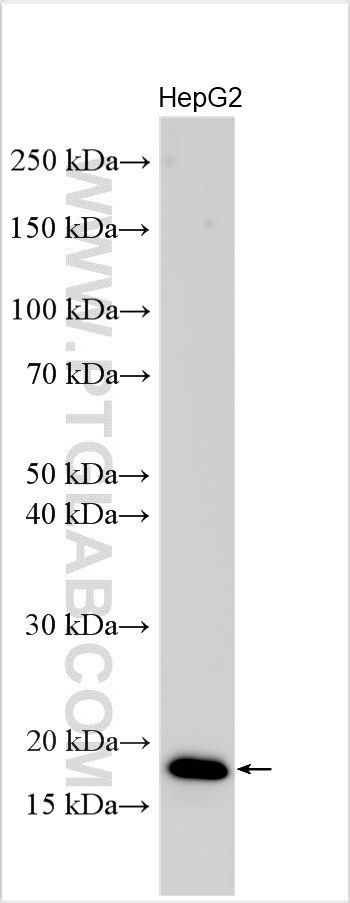验证数据展示
经过测试的应用
| Positive WB detected in | HepG2 cells |
推荐稀释比
| 应用 | 推荐稀释比 |
|---|---|
| Western Blot (WB) | WB : 1:1000-1:4000 |
| It is recommended that this reagent should be titrated in each testing system to obtain optimal results. | |
| Sample-dependent, Check data in validation data gallery. | |
产品信息
15628-1-AP targets EIF4EBP2 in WB, ELISA applications and shows reactivity with human, mouse, rat samples.
| 经测试应用 | WB, ELISA Application Description |
| 经测试反应性 | human, mouse, rat |
| 免疫原 | EIF4EBP2 fusion protein Ag8101 种属同源性预测 |
| 宿主/亚型 | Rabbit / IgG |
| 抗体类别 | Polyclonal |
| 产品类型 | Antibody |
| 全称 | eukaryotic translation initiation factor 4E binding protein 2 |
| 别名 | Eukaryotic translation initiation factor 4E-binding protein 2, eIF4E-binding protein 2, eIF4E binding protein 2, 4E-BP2, 4EBP2 |
| 计算分子量 | 120 aa, 13 kDa |
| 观测分子量 | 15-20 kDa |
| GenBank蛋白编号 | BC005057 |
| 基因名称 | EIF4EBP2 |
| Gene ID (NCBI) | 1979 |
| RRID | AB_3669215 |
| 偶联类型 | Unconjugated |
| 形式 | Liquid |
| 纯化方式 | Antigen affinity purification |
| UNIPROT ID | Q13542 |
| 储存缓冲液 | PBS with 0.02% sodium azide and 50% glycerol pH 7.3. |
| 储存条件 | Store at -20°C. Stable for one year after shipment. Aliquoting is unnecessary for -20oC storage. |
背景介绍
EIF4EBP2(Eukaryotic translation initiation factor 4E-binding protein 2), also named as 4EBP2, is a member of the eukaryotic translation initiation factor 4E binding protein family. EIF4EBP2 is enriched in brain and acts as a regulator of synapse activity and neuronal stem cell renewal via its ability to repress translation initiation. EIF4EBP2 is a repressor of translation initiation involved in synaptic plasticity, learning and memory formation (PubMed:30765518).
实验方案
| Product Specific Protocols | |
|---|---|
| WB protocol for EIF4EBP2 antibody 15628-1-AP | Download protocol |
| Standard Protocols | |
|---|---|
| Click here to view our Standard Protocols |
